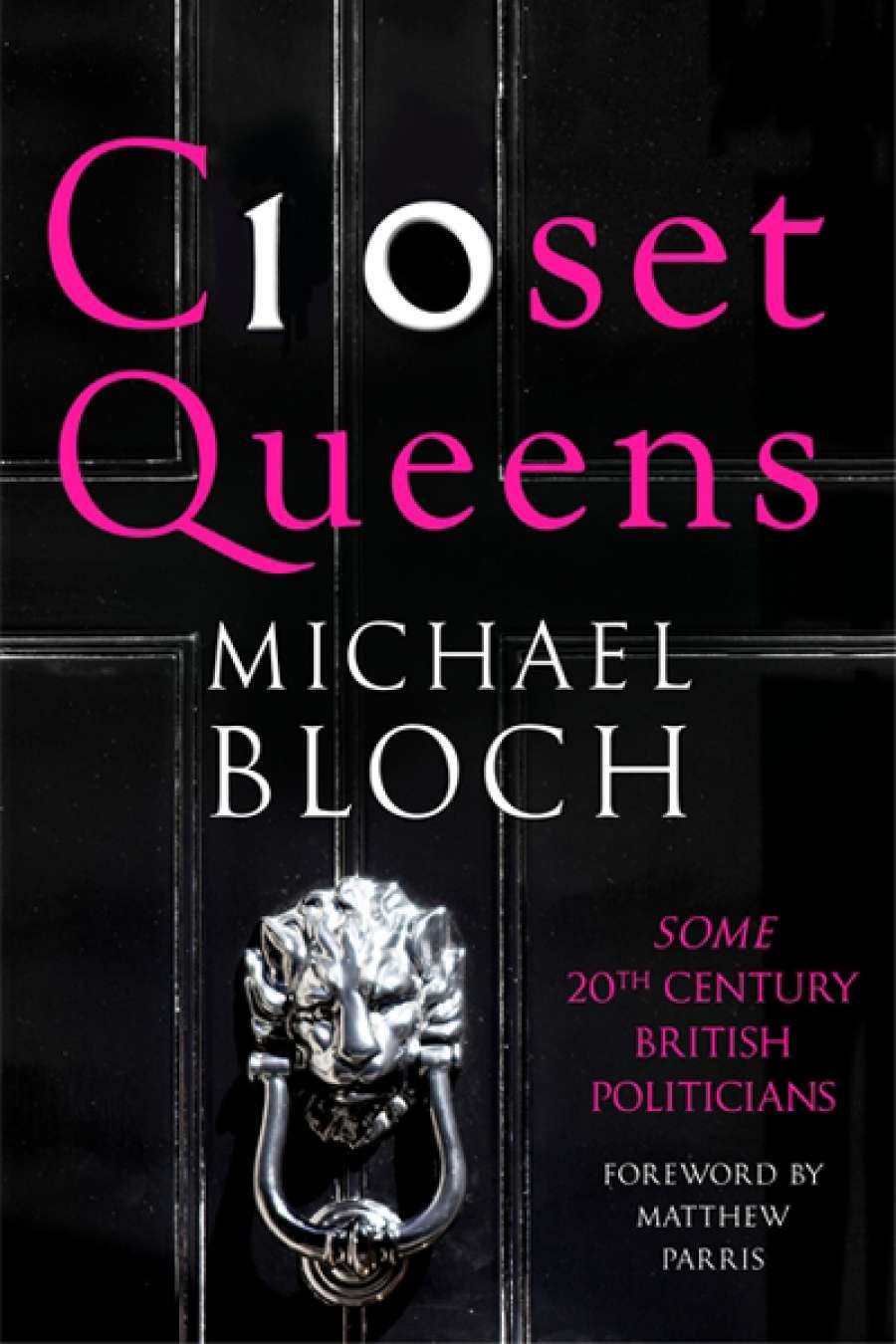
- Free Article: No
- Contents Category: Gay Studies
- Custom Article Title: David Rolph reviews 'Closet Queens' by Michael Bloch
- Review Article: Yes
- Online Only: No
- Book 1 Title: Closet Queens
- Book 1 Subtitle: Some 20th century British politicians
- Book 1 Biblio: Little, Brown, $55 hb, 334 pp, 9781408704127
Whereas his previous book intensely focused on British political life between the 1950s and the 1970s, Bloch's latest book expands its focus to take in a broader period. Closet Queens starts from the late Victorian period and ends with an epilogue bringing the subject up to the present day. The focus is biographical – on great men and more minor political players. The picture that emerges of homosexuality in British politics is complex. What is clear is that, throughout the period covered, there are degrees of openness on the part of the biographical subjects about their sexual conduct and preferences and equally degrees of knowledge and awareness on the part of others. The account is not one of an inexorable movement from repression through tolerance to acceptance. Bloch notes that certain periods were characterised by official indifference, whilst others were characterised by official repression. The most notable example of the latter was the 'Lavender Scare' of the early 1950s, which preceded the landmark and liberalising Wolfenden Report. Keeping his focus on individuals, Bloch records the important role played by particularly homophobic persecutors, such as the tenth marquess of Queensberry (Oscar Wilde's nemesis), the second duke of Westminster, and David Maxwell Fyfe (the first earl of Kilmuir, who responded purportedly to the Wolfenden Report, which he, as Home Secretary, had commissioned, by saying, 'I am not going down in history as the man who made sodomy legal').
What Bloch provides in Closet Queens is a prosopographical account of the real and alleged homosexual political élite of modern Britain. There is a degree of repetition in the book, in part because the lives of the individuals explored keep intersecting, from their early schooldays onwards. That various forms of homosexuality and homosociality may have flourished underground and been tacitly accepted amongst the British political élite is unsurprising, given the homogeneity of the institutions through which these individuals passed. Not only were the Houses of Parliament overwhelmingly male, but the public schools, the universities, the army, and the church were exclusively so. In tracing these men's lives and careers, Bloch does not only expose the diverse and shifting attitudes to homosexuality throughout the period. He also examines how these men and their sexuality were shaped by, or responded to, issues and events, such as imperialism, anti-Semitism, World War I, appeasement, World War II, decolonisation and the end of empire and racial discrimination. He makes it clear that, in more ways than one, homosexuality transcended party lines. He introduces Liberal, Labour, and Conservative gay politicians. In this way, Bloch provides a version of British political history from the late Victorian period to the present day, refracted through these men's personal and public lives.
 David Maxwell Fyfe (photograph by Elliot & Fry via Wikimedia Commons)
David Maxwell Fyfe (photograph by Elliot & Fry via Wikimedia Commons)
The tone throughout Closet Queens is gossipy, without being salacious. Overall, Bloch does not tend to overstate his case in respect of the individuals he portrays. Bloch clearly faces evidentiary problems in the researching and writing of the book. Throughout the book, reference is made to personal papers being destroyed by individuals prior to the death or posthumously on their instruction; letters being expurgated prior to publication, by family members wanting to protect family names or by literary executors wanting to protect reputations; memoirs being written by subjects omitting aspects of their lives; and biographies being written by the sympathetic, the sycophantic, or the squeamish. Writing about sexuality is difficult, particularly when that sexuality was illegal for most of the period in question and when, more generally, discretion discouraged discussion of sexual matters. Necessarily, inference and speculation are involved. Sometimes, the subjects are open or indiscreet. Sometimes, their conduct is open to interpretation. Sometimes, Bloch is willing to accept that some confirmed bachelors were just that, even if they did surround themselves with handsome young men.


Comments powered by CComment